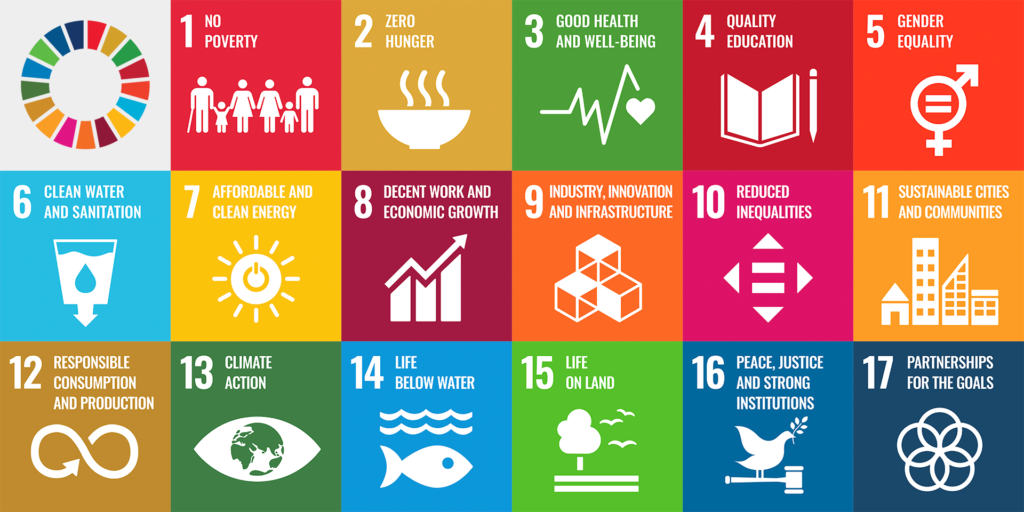When we established our 2030 Sustainability Goals, we strategized our product portfolio goal with applications aligning with the SDGs because of the role we play in developing materials that are intrinsic to daily lives.
Our efforts focused on addressing the five SDGs below in accordance with their relevance to our business. As we continue to strive forward with all our goals, we will be expanding our alignment with the SDGs.
Recycling and reuse are essential components of our alignment to this SDG, and, in 2023, we advanced two recycling technologies that have the potential to reimagine the plastics value chain. In April 2023, we inaugurated our PC dissolution pilot facility at our site in Terneuzen, the Netherlands, and in December, we announced the groundbreaking of our PMMA depolymerization facility at our Rho, Italy, site. Both investments could allow for effective end-of-life plastic recycling and enhance circularity.
Additionally, we utilized our pilot software with Eviden to implement Product Carbon Footprint calculations for our product portfolio. This first exercise was completed in early 2024. An annual review of all PCF data will be conducted to track and analyze our products' carbon footprint from cradle to gate. We are striving to have this data third-party verified so that we can utilize this software for other calculations in the future. Our efforts directly ladder up to Target 12.4—achieving environmentally sound management of chemicals and all wastes throughout their lifecycle and Target 12.5—reducing waste generation through prevention, reduction, recycling, and reuse.
Climate change is a significant threat to our planet and communities. At Trinseo, we understand our responsibility to limit the environmental impact of our products and operations. In 2023, we significantly invested in our decarbonization strategy so that we can continue to reduce our GHG emissions. In addition to the clean energy work we conducted for Scope 2 management, we also established our Scope 3 baseline data and implemented a governance structure to address it. We are working to have our Scope 3 calculations third-party verified.
Additionally, in 2023, we began implementing Product Carbon Footprint calculations for our product portfolio. These calculations help us track, monitor and analyze the environmental impact of our materials throughout its lifecycle, considering supplier carbon emissions and our own footprint. These efforts are supportive of Target 13.2—integrating climate change measures into national policies, strategies, and planning.
Trinseo is taking steps to prevent and significantly reduce marine pollution. Estimates suggest 14 million tons of plastic migrate to the ocean each year, but through our recycling technologies and feedstocks management, we can reduce the impact our operations have on the life below water. With the inauguration of our PC dissolution facility and the groundbreaking of our PMMA depolymerization facility, we are actively eliminating waste plastics that would otherwise be discarded. These recycling technologies enable processing for wastes that are contaminated or previously unrecyclable, and they yield high-quality recycled feedstocks that have similar performance properties as their virgin counterparts.
Additionally, Trinseo is an active member of Operation Clean Sweep® to help limit pellet, flake, and powder loss in the environment and waterways. Through this program, Trinseo has instituted better housekeeping for warehouses, new equipment to prevent pellets and flakes from entering the ecosystem, and more.
These efforts help support Target 14.1—prevent and reduce marine pollution of all kinds.
Trinseo is actively involved in several partnerships and industry initiatives to progress sustainable change. One such example is our partnership with MMAtwo through Heathland, which has enabled our advancement of PMMA depolymerization. Partnerships enable us to push boundaries and work collaboratively within the industry to deliver innovations that help our customers overcome their biggest material challenges.
Additionally, our facilities maintain relationships with the communities where they are located, and we value our local partnerships. Many of our facilities engage in volunteer activities throughout the year to help better their communities and reduce their environmental impact. Through our partnerships, we are supporting Target 17.17—encourage and promote effective public, public-private, and civil society partnerships.

